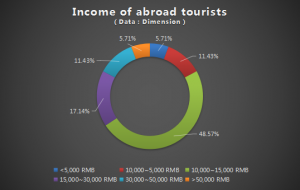Rong360 Jianpu Technology Inc. (NYSE:JT) Survey: Post-1990s Chinese Travel Costs the Least
Jianpu Technology (NYSE:JT)
BEIJING, CHINA, December 9, 2019 /EINPresswire.com/ -- Recently Rong360 Jianpu Technology Inc. (NYSE:JT) conducted an in-depth survey on Chinese tourism consumption behavior. Rong360 Jianpu Technology Inc. (NYSE:JT) survey found that this year, the majority of people choose to travel abroad after tax income of 10,000-15,000 RMB, accounting for 48.57% , nearly half of the number of outbound tourists.Moreover, about 45.71% of the people choose to stay in medium-and high-end hotels, while 37.41% choose economy hotels, 14.29% of the people stay in bed-and-breakfast hotels and 2.86% of the people stay at relatives and friends' homes.
Although only 34.29% of people overspend on outbound travel, the items with the most overspend are concentrated on shopping, with almost 83% having the experience of overspending.
According to the survey, 54 percent of people in the shopping category spent the most on beauty products.
Ms. Wang, who lives in Beijing, travels abroad with her husband at least once a year. Influenced by high taxes at home and abroad, skin care products and cosmetics have become a regular customer in Miss Wang's shopping list. Not only that, in the gift choice for friends, in addition to local specialties, skin care products and cosmetics are also the best choice for Ms. Wang's female friends.
In addition to the shopping and consumption of outbound tourists and domestic travel have more obvious characteristics, in the consumption of food and beverage and domestic long-distance and peripheral travel have obvious differences.
According to the survey, the single-trip dining expenses of domestic tourists accounted for the largest proportion between 50-100 RMB, with 49.57% of the domestic long-distance tourists and 47.44% of the peripheral tourists spending on dining within this range, and almost 90% of the domestic tourists are spending less than 200 RMB on food. The average per capita dining expenses of overseas tourists are mainly between 50-300 RMB, and 33.33% of them spend between 200-300 RMB, accounting for the largest proportion. The proportion of people spending between 100-200 RMB and 50-100 RMB is 27.78% and 22.22% respectively.
In terms of hotel and dining expenses, people who travel abroad generally spend more than those who travel within China.
In recent years, with the rise of new young consumers, the consumer market is gradually tilting to the post-90s. "consumption ahead of time" and "hedonism" , however, "Dimension" through the survey found that in the travel market, the post-90s consumer intentions far less than the post-70s, post-80s.
According to the data, 47.83% of the post-70s who had traveled in the past year spent 10-20% of their annual income on travel; the post-80s accounted for 43.69% of their annual income; the post-90s accounted for the least, 34.65% .
At the same time, travel consumption-to-income ratio in the 5%-10% range of the concentration of 47.52% of the post-90s. The post-70s and post-80s in this range are relatively small, only about 30% .
But even so, the development of the Internet has made societies more inclusive and allowed for the development of more diverse values. In our survey, we found that while more than 90% of people spend less than 30% of their income on their trips over the course of a year, there are still some people who spend more than 30% .
For example, 4.95% of the post-1990 generation spend between 30% and 50% of their total income on travel, while 0.97% of the post-1980 generation spend more than 50% of their total income on travel.
Influenced by her parents' hobby of traveling, Miss Ma who was born in 1990 was a real travel enthusiast. In addition to the annual holidays and weekends, Miss Ma also takes time off to travel.
This spring, she quit her job at the last company and took a break to travel to Yunnan with her boyfriend. The trip, which lasted nearly a month, cost about 10,000 RMB.
"We go in the off-season, when airfare is cheaper, we stay in youth hostels and share our experiences with a lot of people from around the world who love to travel. We eat most of our meals in little-known restaurants, where the taste is authentic and the price inexpensive. We go to villages in Yunnan, where the rice terraces are beautiful, and we learn how to spin with an 80-year-old grandmother. 10,000 RMB, that's a lot of fun,"Ms. Ma said.
Di Wang
Jianpu Technology
+86 10 8262 5755
email us here
Legal Disclaimer:
EIN Presswire provides this news content "as is" without warranty of any kind. We do not accept any responsibility or liability for the accuracy, content, images, videos, licenses, completeness, legality, or reliability of the information contained in this article. If you have any complaints or copyright issues related to this article, kindly contact the author above.



